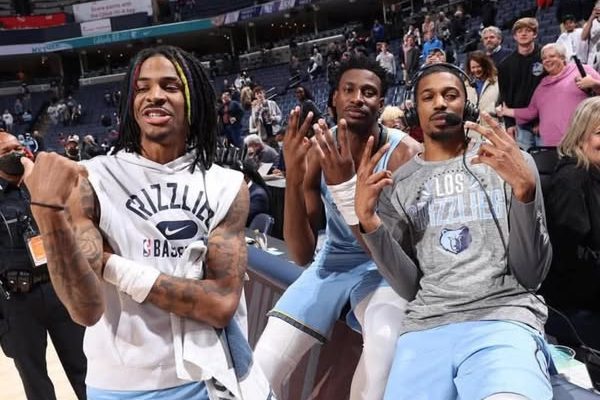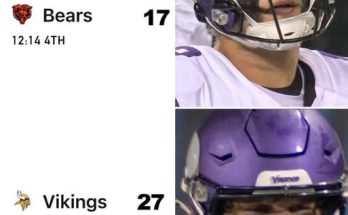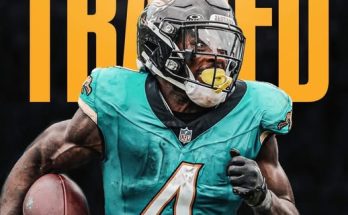In a season few could have predicted, the Memphis Grizzlies have not only defied expectations—they’ve completely rewritten the narrative around their franchise. What began as a campaign marked by cautious optimism has evolved into a spectacle of domination, resilience, and historic achievement. The team has officially shattered a 12-year record, cementing its status as one of the most formidable and respected franchises in recent NBA memory. For fans who have followed the Grizzlies from their humble beginnings and early playoff struggles to now witnessing this unprecedented success, the journey feels not only validating but emotionally transcendent. Memphis basketball is no longer about grit and grind alone; it’s about excellence, evolution, and elite performance under pressure.
The record in question? The Grizzlies’ win percentage through the first half of the season surpassed any stretch in franchise history, even topping the electric 2012-2013 campaign that brought the team to the Western Conference Finals for the first time. But this year, they didn’t just win games—they overwhelmed opponents, dominated marquee matchups, and made a statement to the rest of the NBA: Memphis isn’t just here to compete. Memphis is here to conquer. The seismic shift has been powered by a perfect confluence of emerging stars, seasoned leadership, and a coaching staff that has found a way to blend modern offensive schemes with the city’s old-school toughness.
Of course, the conversation begins with Ja Morant. Though his season began with controversy and off-court concerns, what he’s done since returning to the court has been nothing short of miraculous. More mature, more focused, and arguably more dangerous than ever before, Morant has turned potential into proof. His averages are staggering, his efficiency is up, and his leadership has reached new heights. In several games this season, he didn’t just lead Memphis to victory—he took over games in a way that few players in the league are capable of. Whether it’s slicing through defenses with his elite handle, orchestrating alley-oops with surgical precision, or knocking down clutch threes with the game on the line, Morant has played like a man possessed. He’s no longer just a highlight-reel player. He’s a cornerstone of a team with real championship aspirations.
But the Grizzlies’ success this year is far from a one-man show. Jaren Jackson Jr. has taken another leap forward, solidifying his place as a defensive anchor and multi-dimensional scorer. His shot-blocking instincts remain elite, but what’s impressed most this season is his expanded offensive arsenal. He’s not just a pick-and-pop big anymore—he’s putting the ball on the floor, initiating offense, and showing comfort in isolations. His chemistry with Morant is undeniable, and their two-man game has become one of the most effective in the NBA.
The emergence of Desmond Bane has also played a critical role in the Grizzlies’ record-breaking season. Bane has gone from promising rookie to bonafide star in just a few years, and this season he’s playing like an All-Star. His ability to shoot from deep, drive to the basket with power, and defend multiple positions gives Memphis the kind of versatile weapon every contender needs. What’s more, Bane’s work ethic and quiet leadership have set a tone in the locker room that resonates beyond his stats.
Complementing the big three is a bench unit that ranks among the best in the league, both in production and cohesion. The front office’s moves over the past two seasons—acquiring undervalued talent, developing young players, and resisting the urge to break up the core prematurely—have paid off handsomely. Santi Aldama, David Roddy, and rookie sensation GG Jackson have all given the Grizzlies consistent contributions, with Jackson in particular showing signs of becoming a future star in his own right. His length, athleticism, and poise at just 19 years old are almost eerie, and his presence has given the coaching staff unmatched lineup flexibility.
Coaching, of course, has been the glue holding everything together. Taylor Jenkins, often overshadowed by bigger names in coaching, has finally received the recognition he deserves this season. Jenkins has found the perfect balance between tactical innovation and motivational clarity. His rotations are crisp, his timeouts well-timed, and his game plans often outmaneuver even the league’s top minds. But perhaps his greatest skill lies in his ability to connect with his players. In a league where egos can easily fragment locker rooms, Jenkins has fostered a culture of humility, effort, and shared accountability. Every player knows their role, and every player is ready when called upon. That’s not just rare—it’s elite.
Another defining trait of this season has been Memphis’s ability to perform on the biggest stages. Their record against the NBA’s top-tier teams is staggering. They’ve logged statement wins against defending champions, outdueled MVP candidates, and silenced packed arenas on the road. More than once this season, a nationally televised game has turned into a Memphis showcase. The team’s mix of flair and fundamentals makes them not just effective, but entertaining. The basketball world is watching, and for the first time in a long time, Memphis is setting the tempo.
Defensively, the Grizzlies have returned to their roots. While offensive evolution has become a trademark this year, their ability to lock down opponents in the half court has become a calling card once again. They lead the league in several defensive efficiency metrics, with their rotations crisp, their switches disciplined, and their transition defense airtight. It’s been a return to the gritty, grimy DNA of old—but now, it’s paired with explosive scoring and modern versatility.
Off the court, the city of Memphis is thriving on the back of the team’s success. FedExForum is sold out nearly every night, and the atmosphere inside the building has become one of the most electric in all of sports. Fans wear their hearts on their sleeves, and the players feel that support deeply. Community initiatives have increased, youth basketball programs are flourishing, and the team has become a source of civic pride in a way that transcends basketball. In a city that knows struggle, the Grizzlies’ triumphs feel deeply personal.
One of the most important developments this season has been the national media’s changing tone. For years, the Grizzlies were considered a fun, scrappy team—entertaining, but not a true threat. This season changed all that. Pundits and analysts are now talking about Memphis in the same breath as Boston, Milwaukee, and Denver. They’re not asking if the Grizzlies can compete—they’re asking who can stop them. That shift in perception is as important as any win-loss record. In the NBA, status matters. And right now, the Memphis Grizzlies have more of it than ever before.
The historic nature of this season has also sparked conversations about legacy. For players like Morant, Jackson, and Bane, the path to greatness is becoming clearer. If they can keep this level of play through the postseason, they won’t just be local legends—they’ll be remembered as the trio that delivered Memphis its first NBA championship. For Taylor Jenkins, a deep playoff run could elevate him into Coach of the Year territory. And for the franchise as a whole, this season represents a turning point. No longer are they chasing respect—they’ve earned it, and they’re now demanding results to match.
None of this was promised. In a Western Conference stacked with talent, injuries, and unpredictability, the idea that Memphis would not only survive but thrive at this level is astounding. Yet here they are, breaking records and building a new legacy brick by brick. What they’ve done this season is not just about wins and losses—it’s about transformation. It’s about showing the basketball world that a small-market team, built through smart drafting, tough coaching, and relentless effort, can become a juggernaut.
The Grizzlies’ 12-year record may have been the headline, but it’s only part of the story. What’s truly happening in Memphis is the emergence of a franchise entering its golden era. With youth, talent, depth, and culture all aligned, the ceiling isn’t just high—it’s undefined. And for fans, players, and the city alike, this unprecedented success feels like the beginning of something even bigger.



